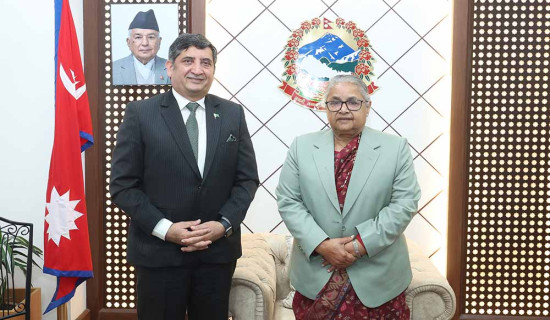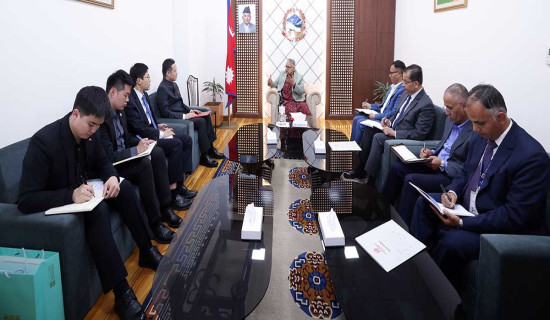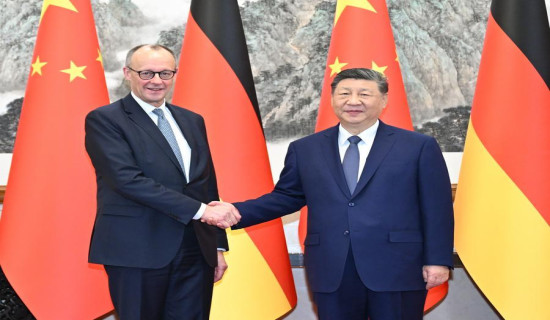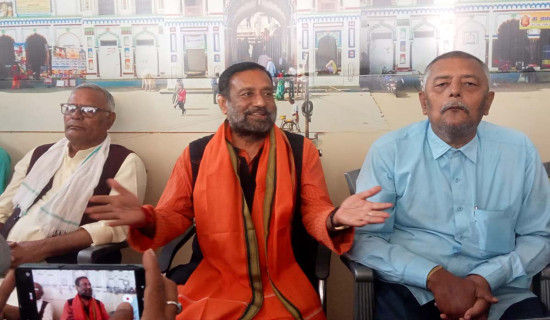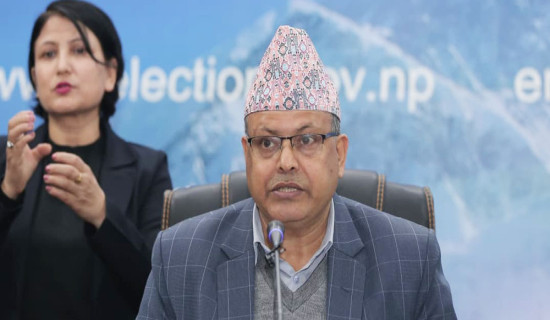- Saturday, 28 February 2026
Ruling Coalition In Driving Seat
Narayan Upadhyay
With its ‘stunning results,’ the November 20 general election for the House of Representatives (HoR) gave no one party a clear majority. All forecasts made prior to the election that the Nepali Congress-led coalition will run away with the election by earning a landslide majority have come to nought. Against the predictions of its adversaries, the UML party, which has now been confined to about 82 to 85 seats, generated rather good results, albeit it failed to duplicate its record from the 2017 elections, when it had gained 122 HoR seats.
As vote counting finishes up this week, the governing coalition looks to have a lead over opposing parties, including the parties who fought the poll under a UML-led alliance. If everything goes as planned, the coalition of NC, CPN-Maoist Centre, CPN-Unified Socialist Party, Loktantrik Samajwadi Party and Janmorcha that has collectively gained a simple majority by crossing the 138 seat mark in the 275-member HoR, will form the new government, though it has yet to select who would become the next prime minister.
Oli’s attempts
Interestingly, as results have trickled in, the UML chief KP Sharma Oli is seen making every attempt to secure support from enough newly elected lawmakers for him to form a government. After gaining second place in the votes conducted for the Lower House, Oli urged Maoist Centre chair Pushpa Kamal Dahal Prachanda to join hands with him, which the latter declined. Oli is anticipated to take every conceivable step to impede the governing coalition in creating its government. Due to his anti-constitutional measures of dissolving HoR twice and his government’s indulgence in irregularities during and after the breakout of the coronavirus pandemic, political experts had projected that Oli’s party would score poorly in the November 20 vote. But that did not materialise, as the five-party coalition could not stop the UML from becoming the second largest party in the House.
However, the loss of seats for the UML meant a gain for the Nepali Congress and a few other newly set up parties. The NC won more seats in the federal and provincial legislatures this time around, becoming the single biggest party. The Congress-led coalition, by virtue of gaining majority seats in seven provinces, will establish its government in all provinces. Alliance partners are poised to agree on distributing chief ministerial and ministerial seats. Oli’s inappropriate and unlawful conduct while he was at the government leadership hurt the UML’s chances, since it lost some seats in provinces too. The vote result has forced the UML and its coalition partners — the RPP, Janata Samajwadi Party, and a few others — to stay on the opposition bench.
What is surprising about the result of the November vote is the growth of three parties. The Rabi Lamichhane-led Rastriya Swatantra Party, together with Resham Chaudhari's Nepal Unmukti Party and CK Raut's Janamat Party, and the better showing of the pro-royalist, pro-Hindu RPP, rattled national politics. The successes of these parties also demonstrate that the public were disillusioned with conventional parties like as the Nepali Congress, the UML, the Maoist Centre, and Madhesh-based parties.
Lamichhane’s party, if the poll result is any indicator, will become a key factor in the national political scene with its around 17-18 seats, which it will win via a combination of first-past-the-post and proportional representation systems. Chaudhari’s Nagarik Unmukti Party made its breakthroughs in the Tharu community-dominated seats of western Nepal, while Raut’s party gained one seat in the east Terai’s Madhes, but it hurt the hopes of the established parties of Janata Samajwadi and Loktantrik Samajwadi. RPP made inroads into the established parties' votes. The pro-royalist movement generated remarkably beneficial outcomes, especially because to its partnership with Oli.
There is no denying that these parties rose to prominence in the nation's political landscape as a result of voters' rage against traditional parties, whose leaders were frequently blamed for being greedy for power, position, and pelf, for which they engaged in unconstitutional and corrupt practices and ignored the promises they had made to the people.
Indulgence in nepotism is another criticism these leaders have received, which contributed to their inability to pick for skilled cadres, employees, and citizens. Many leaders of these traditional parties were ministers and prime ministers on many times, yet they abjectly failed to speed the development of their constituencies, districts, regions and the country. The issue surrounding unemployment and backwardness has not changed significantly even though these parties have remained in the government multiple times. This has led to a boiling rage among the populace.
Wake-up call
The result of this election has sent a message that no one can deny: the disillusioned people have demonstrated their proclivities to vote for alternative forces that can deliver. The three aforementioned parties increased the hopes of the voters as they addressed people’s worries. They pledged to realise the expectations of the people who were disillusioned with the conventional parties and their leaders. The decreased number of parliamentary seats obtained by the Nepali Congress, UML, Maoist Centre, Unified Socialist Party, JSP, and LSP is a sign that those who voted for them in the past are not satisfied with them this time around.
The result of the elections is undoubtedly a wake-up call to the Nepali Congress, the UML, and the Maoist Centre. If they fail to modify their methods, the result of the next election will clearly be the worst one for them. In every democratic system, the anti-incumbency factor plays a significant role. The loss of many prominent leaders of the traditional parties, ministers of previous and current administrations, and party top brasses revealed that people constantly examined the performance of the leaders while they had high ministerial and party roles. The election results have taught our main parties and leaders to fix their previous errors and deficiencies and work selflessly for the welfare of the nation and the people.
(Upadhyay is Managing Editor of this daily)









-original-thumb.jpg)

